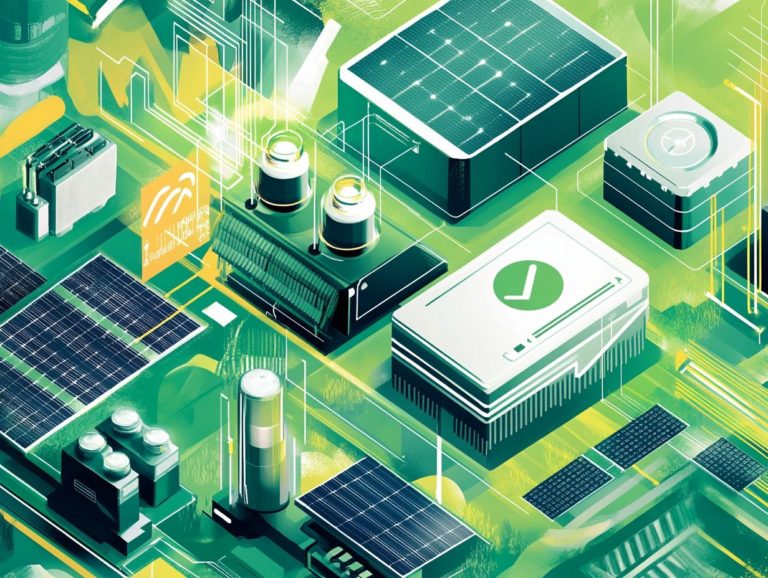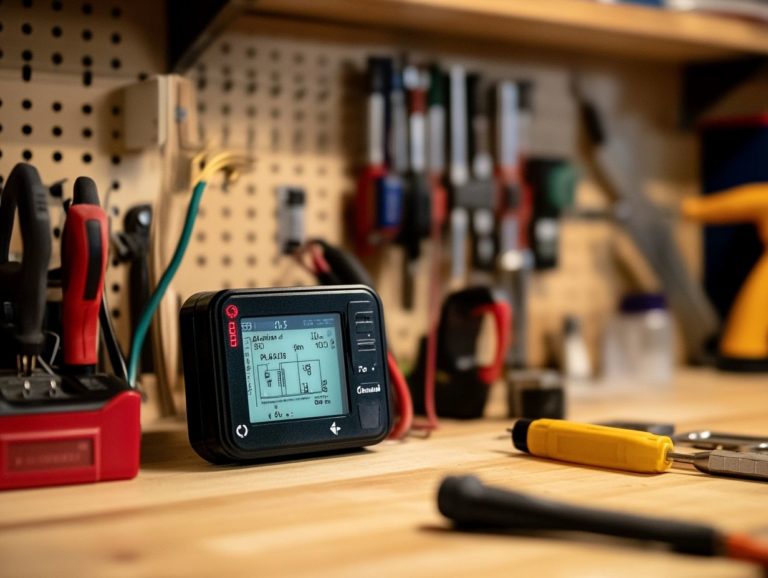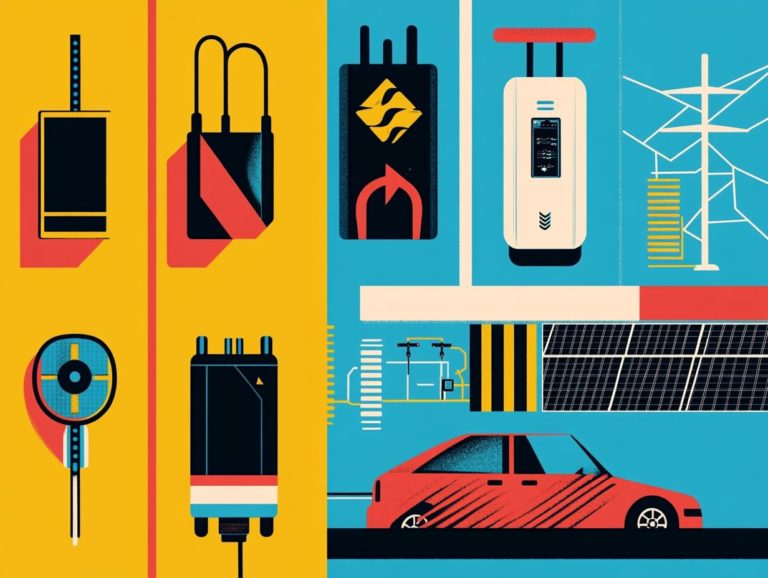Energy Storage for Electric Vehicles: A Homeowner’s Guide
As electric vehicles (EVs) continue to gain traction, the significance of energy storage systems becomes increasingly evident.
Grasping energy storage for your EV is essential if you’re looking to maximize your investment, enhance convenience, and contribute to a sustainable future. This guide shows you how to explore the myriad benefits both environmental and financial that energy storage systems offer. You’ll also discover the different types available and key factors to consider before making a purchase.
Additionally, you’ll uncover practical tips on installation and maintenance to ensure your system operates at peak performance. Dive in to find out how energy storage can revolutionize your EV experience!
Contents
- Key Takeaways:
- Benefits of Energy Storage for EVs
- Types of Energy Storage for EVs
- Factors to Consider Before Investing in Energy Storage for EVs
- Installation and Maintenance of Energy Storage Systems
- Frequently Asked Questions
- What is energy storage for electric vehicles and why is it important?
- What are the different types of energy storage for electric vehicles?
- Can I install energy storage for my electric vehicle at home?
- What are the benefits of having energy storage for my electric vehicle at home?
- Is energy storage for electric vehicles safe to use at home?
- How can I maintain my energy storage for electric vehicles?
Key Takeaways:

- Energy storage for EVs offers environmental benefits, cost savings, convenience, and flexibility for homeowners.
- Types of energy storage include battery systems and hydrogen fuel cells.
- Before investing, consider costs, compatibility with EVs, and maintenance requirements for optimal performance.
What is Energy Storage for EVs?
Energy storage for electric vehicles (EVs) encompasses systems specifically designed to capture energy generated from renewable sources or during off-peak electricity hours times when demand for electricity is lower, usually at night. This capability enables you to charge your electric vehicle efficiently and manage energy costs while enhancing grid stability, which means a more reliable and balanced supply of electricity.
Typically, these systems are powered by advanced lithium-ion batteries, which facilitate superior energy management and provide backup power solutions.
By seamlessly integrating energy storage systems with solar setups, you can harness solar power during peak sunlight hours. You can store any excess energy for later use, particularly beneficial when electricity rates soar in the evening. This strategy empowers you to be energy independent and ensures your EV charges efficiently when you need it most!
The ability to store energy effectively contributes to reducing dependence on fossil fuels, fostering a sustainable energy ecosystem that ultimately benefits both the environment and the economy.
Benefits of Energy Storage for EVs
The advantages of energy storage for electric vehicles (EVs) go far beyond simple functionality. They embody a commitment to environmental sustainability, offer significant cost savings, and provide enhanced convenience for homeowners.
This transformative approach reshapes your perspective on energy consumption and vehicle charging within today s evolving energy landscape.
Environmental and Cost Benefits
The environmental and cost benefits of energy storage systems for electric vehicles (EVs) are substantial. By reducing reliance on fossil fuels and maximizing the use of renewable energy, these systems can lower electricity costs for homeowners like you.
When you enable off-peak charging, you help shift energy consumption away from peak demand times. This not only eases the strain on the grid but also minimizes the necessity for additional fossil fuel power generation. The result? A significant reduction in greenhouse gas emissions while enjoying lower utility rates during those off-peak hours.
Energy storage enables you to make the most of solar and wind energy, allowing you to store excess energy for later use. This enhances your overall energy efficiency. By integrating energy storage into your home, you contribute to a cleaner environment while reaping tangible financial savings.
Explore your energy storage options for your EV today!
Convenience and Flexibility
The convenience and flexibility of energy storage systems for electric vehicles (EVs) enable you to charge your car at optimal times. This allows for more effective management of your energy consumption and enhances your overall energy independence.
By utilizing smart charging solutions, you can synchronize your charging with off-peak electricity rates. This significantly reduces costs while optimizing your energy use.
Vehicle-to-home technology allows your electric vehicle to supply power back to your home when needed, acting as a backup power source during outages. This ensures that essential appliances remain operational.
This integration connects seamlessly with your home energy management systems, giving you real-time monitoring and control over your energy flows.
These innovations not only promote eco-friendly practices but also support a sustainable lifestyle, enriching your comfort and efficiency in daily living.
Types of Energy Storage for EVs
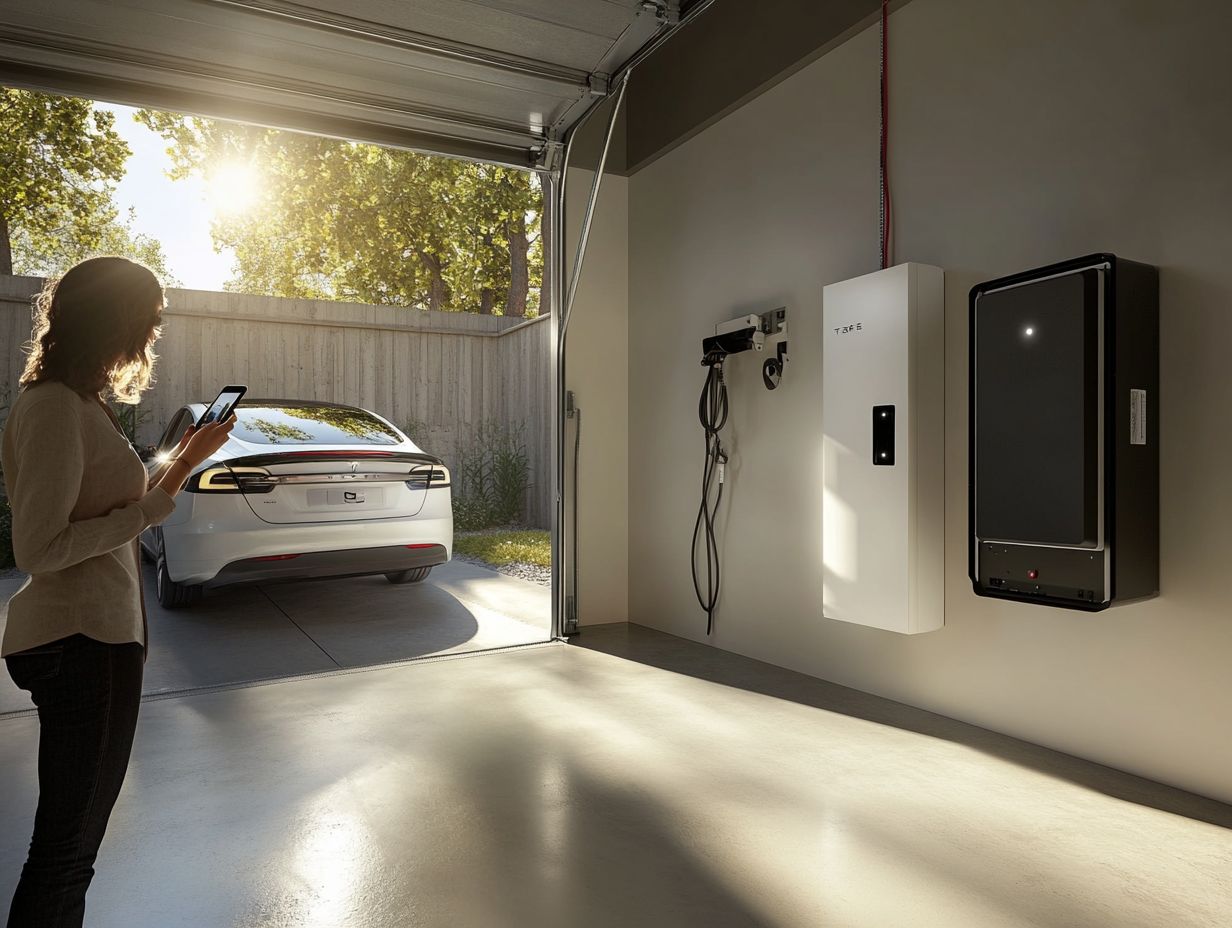
You ll find a variety of energy storage systems available for electric vehicles (EVs), each presenting its unique benefits and advanced technologies.
From the tried-and-true lithium-ion battery storage systems to the cutting-edge hydrogen fuel cells, these options significantly enhance energy resilience and performance.
Battery Storage Systems
Battery storage systems powered by lithium-ion technology are crucial for electric vehicles (EVs). They enable efficient energy management and help you leverage renewable energy sources for charging.
These sophisticated systems boost the overall efficiency of your energy consumption and offer substantial cost savings. By allowing you to store low-cost energy generated during off-peak hours, you can save money by using energy when it’s cheaper. When integrated with solar panels or wind turbines, you contribute to a more sustainable energy ecosystem.
These solutions play a vital role in stabilizing the grid and balancing supply and demand fluctuations. They also reduce reliance on fossil fuels.
Their benefits also extend into the commercial realm, where they help businesses optimize operational costs while supporting broader energy resilience initiatives. With these advancements, you re not just improving your energy strategy you re actively participating in a more sustainable future.
Hydrogen Fuel Cells
Hydrogen fuel cells embody a revolutionary advancement in energy storage for electric vehicles (EVs), providing you with a clean and efficient alternative to traditional battery systems, all while championing environmental sustainability.
These groundbreaking systems harness the interactions of hydrogen and oxygen to generate electricity, producing nothing more than water vapor as a byproduct. This not only cuts down on pollution that harms the environment but also aligns seamlessly with the global movement towards renewable energy sources.
By embracing hydrogen fuel cells, you can play a pivotal role in helping the automotive industry significantly reduce its carbon footprint and make meaningful progress toward ambitious climate goals.
The scalability and versatility of this technology allow it to be utilized across various sectors, from public transportation to stationary power generation, thereby amplifying its impact in the realm of sustainable energy solutions.
Factors to Consider Before Investing in Energy Storage for EVs
Before you commit to investing in home energy storage systems for your electric vehicles (EVs), it s crucial to weigh several key factors.
Consider the initial costs, the potential return on your investment, and how well the systems align with your existing electric vehicle models and home energy infrastructure. Careful evaluation of these elements will ensure that your investment meets your needs and expectations.
Taking the time to evaluate these factors now can lead to smarter energy decisions for your future!
Costs and Return on Investment
Evaluating the costs and return on investment for energy storage systems in electric vehicles (EVs) is a vital step in maximizing energy efficiency and long-term savings.
Understanding the financial components associated with energy storage enables informed decision-making. Start with the initial setup costs, which include the price of the storage system, installation fees, and any necessary infrastructure upgrades.
Don’t overlook ongoing operational costs like maintenance and potential utility fees, as they significantly impact your financial picture.
Calculating projected savings from reduced electricity bills and available incentives offers a clearer understanding of the system s overall value. By analyzing these factors, you can assess your potential savings and see how quickly you can achieve a favorable return on your investment. This journey toward energy independence is not just possible; it’s within your reach!
Compatibility with EVs

Ensuring compatibility between energy storage systems and electric vehicles (EVs) is crucial for effective performance, safety, and optimal energy management.
This compatibility covers various elements, including specific requirements for charging equipment such as connectors, voltage levels, and power ratings that must align perfectly with both the EV and the storage system.
Incorporating smart charging solutions significantly boosts efficiency and convenience, allowing your EVs to communicate with energy storage units. This communication optimizes charging times, enabling your vehicles to draw power when rates are lowest.
Understanding these technical specifications and integration options is essential for anyone looking to maximize their investment in renewable energy technologies. This way, you can ensure that your systems work together seamlessly, enhancing both performance and peace of mind.
Installation and Maintenance of Energy Storage Systems
The installation and maintenance of energy storage systems for electric vehicles (EVs) are essential for ensuring the safety, efficiency, and longevity of your equipment.
Following installation guidelines and adhering to maintenance protocols is key to achieving optimal performance.
Installation Process and Requirements
The installation process for energy storage systems that support electric vehicles (EVs) entails crucial requirements, such as compliance with safety standards for electrical products and adherence to local electrical codes. These steps ensure efficient operation and safeguard your safety and the surrounding environment.
To get started, gather essential equipment, which typically includes:
- Energy storage unit
- Inverter
- Wiring components
- Mounting hardware
Consulting a qualified electrician is a wise choice to navigate the installation process accurately. Proper safety precautions, like wearing protective gear and following lockout/tagout procedures, are vital to mitigate potential hazards. Understanding local regulations and securing necessary permits is crucial for compliance and long-term success.
For more information or assistance, consider reaching out to professionals who can help you every step of the way!
Maintenance Tips for Optimal Performance
Regular maintenance is vital for ensuring your energy storage systems for electric vehicles (EVs) perform at their best. This involves routine checks and adherence to safety precautions to prevent issues like thermal runaway failures, a situation where a battery overheats and can catch fire.
Take a proactive approach by scheduling periodic inspections. Assess battery health, check for corrosion at connections, and verify that ventilation systems are functioning properly to reduce overheating risks.
Implementing monitoring systems, such as battery management software, offers real-time insights into performance metrics. This helps you identify any irregularities that could signal potential failures.
Incorporate safety checks, like manual disconnects and temperature sensors, to enhance the security of your energy storage setup. By prioritizing these best practices, you not only extend the lifespan of your systems but also maximize efficiency, leading to more sustainable and cost-effective energy usage.
Frequently Asked Questions
What is energy storage for electric vehicles and why is it important?
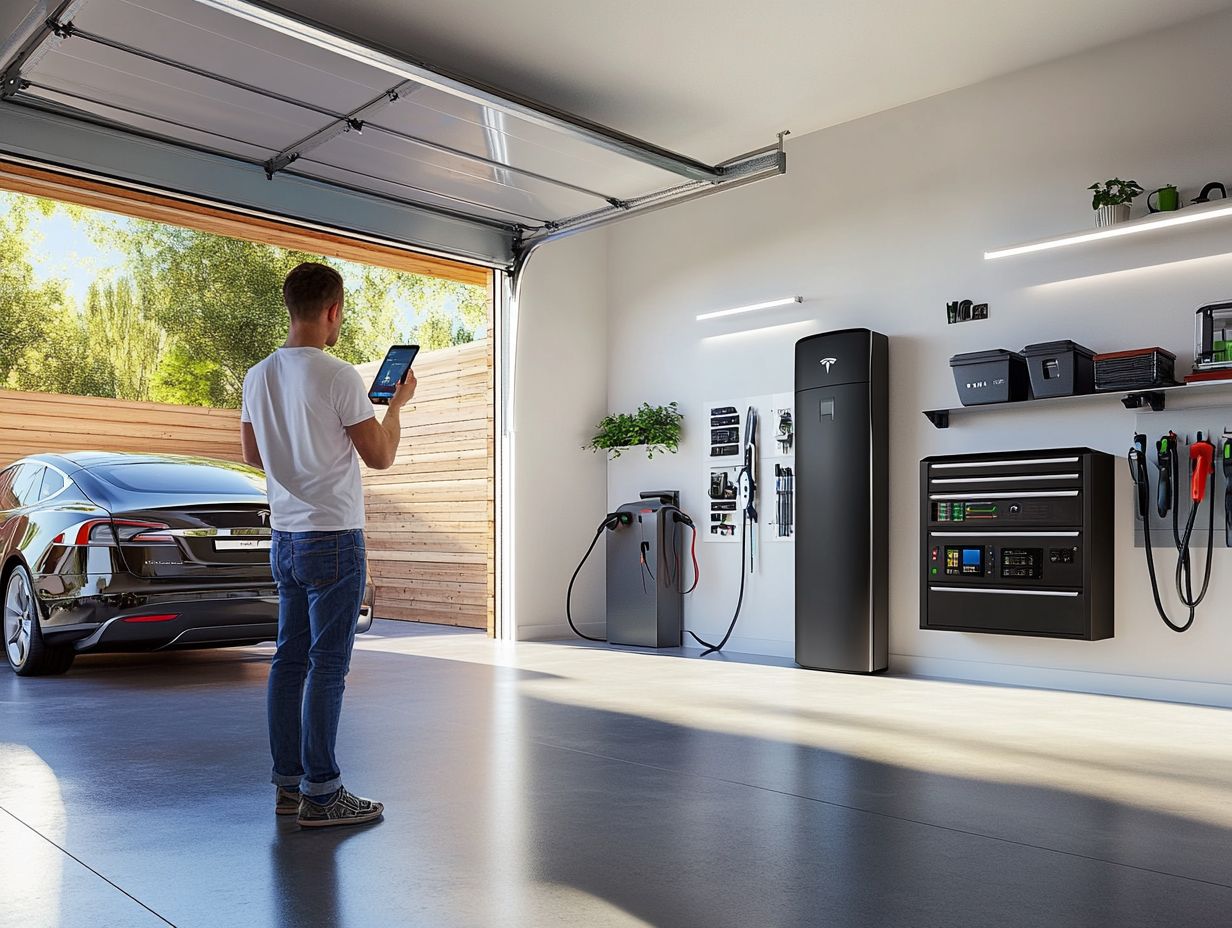
Energy storage for electric vehicles refers to the technology used to store energy in order to power electric vehicles. This technology is game-changing! It gives you a longer driving range and reduces the hassle of frequent charging.
What are the different types of energy storage for electric vehicles?
The two main types are battery storage and hydrogen fuel cell storage. Battery storage is the most common, using rechargeable batteries, while hydrogen fuel cell storage uses hydrogen gas to produce electricity.
Can I install energy storage for my electric vehicle at home?
Yes, homeowners can install energy storage for their electric vehicles at home. This can be done through a professional installation or by using a home energy storage kit.
What are the benefits of having energy storage for my electric vehicle at home?
Having energy storage for your electric vehicle at home allows for convenient and fast charging without the need to visit public charging stations. It also helps reduce electricity costs and can provide backup power in case of a power outage.
Is energy storage for electric vehicles safe to use at home?
Yes, energy storage for electric vehicles is generally safe to use at home. However, it is important to follow proper installation and usage guidelines to ensure safety. It is also recommended to have a professional inspect the installation to confirm it meets safety standards.
How can I maintain my energy storage for electric vehicles?
Maintaining energy storage for electric vehicles is similar to maintaining any other household appliance. Regularly check for damages or malfunctions and follow recommended maintenance schedules. Use proper charging techniques and avoid overcharging or discharging the storage unit.
Ready to enhance your EV experience? Explore our home energy storage kits today!


